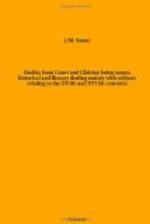To this, Henry deigned to reply that he should be sorry if his good brother and nephew treated her otherwise than a son should treat his mother. As it appeared from certain evidence, she was well-handled, and had grown to much wealth and quiet; but according to other reports, quite the contrary, so that he was in doubt which to believe. “Also,” he continues, “having heard at other times from you of your evil-treatment by your son and Lord Muffyn (sic), and as we are sending the bearer into those parts, on our business, we desire you to show him the points wherein you note yourself evil-handled, and whether you desire us to treat of them with your son, or only generally to recommend your condition.” *
* State Papers, v. 63, 65.
Margaret had remained faithful to Lord Methven for about ten years, and it was not till 1537 that she thought of formally applying for a divorce, her chief plea being that be wasted her money, although she said she had “forty famous proofs” against him.*
* Hamilton Papers, 13th Oct. 1537, f. 105.
James was furious, and ordered that the divorce, whether obtained at the cost of more false oaths, or whether Margaret’s so-called third husband really had a wife living when the union was contracted, should not be proclaimed in Scotland.
This constituted Margaret’s famous grievance against James, his objection to her divorce being, his mother declared, the fear lest she should pass into England and remarry the Earl of Angus. “And this Harry Stuart, Lord of Methven, causes him to believe this of me!” she exclaimed contemptuously.* One plea for getting rid of the now despised Harry Stuart is too amusing to be omitted. James was in France, whither he had gone to bring home his bride, the young and beautiful Magdalene, daughter of the French king, and Margaret thought to induce Henry to interest himself in her divorce through his jealousy of the French.
* State Papers, v. 119.
After begging him to send a special messenger to the king her son, to know his “utter mind,” she says: “For now, dearest brother, your Grace I trust will consider that now the queen his wife is to come into this realm soon after Easter, as he hath sent word here, to make ready for the same, and that being, it will be great dishonour to him that I, his mother, having a just cause to part, can nought get a final end; and I trust your Grace will consider I may do your Grace and my son more honour to be without him (Lord Methven) than to have him, considering that he is but a sober man, and if the Queen that is to come, see me not entreated as I should be, she will think it an evil example.” *
* Hamilton Papers, f. 109.
But all her efforts were fruitless; Henry could not be persuaded to take up her quarrel, and James was obdurate. His mother, however, then in her forty-ninth year, dispensed with legal formality altogether, and allied herself to a certain John Stuart, who, according to some, is identical with the adventurous Earl of Arran, so notorious in the reign of James vi.




